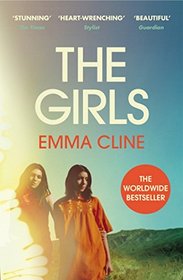Reading the blurb, you assume this is about a girl joining the Manson Family. And it is. Except of course, all names have been changed so we can pretend that's not what it's about it all. It pretends to be about some other group of people, even though a lot of the details are the same (like Charles/Mitch's attempts to become a professional musician). Ironically, it contains the standard, "This is a work of fiction" disclaimer, saying any resemblance to real people or events is coincidental when it's quite clear it's not coincidence at all. I'm sure there are legal reasons for the choice, but it feels very false. Either write a book about the Manson Family, or change everything. But to use all the exact details except with different names seems odd.
All that aside, the book is disappointing. The author tries too hard to be artistic and in doing so, fails to tell an interesting story.
Unbearably overwritten and indulgent. Exploitative, given that it's a "reimagining" of real-life, horrific murders.
What you have here is what I'd describe as "creative writing-itis:" so desperate to seem poetical, odd and edgy that all sense and style go straight out the window.
There are misplaced modifiers, with interesting results. My father ... left beer bottles on the steps that trapped wasps and beat his bare chest in the morning to keep his lungs strong. (Clever wasps, eh?)
There are wild overstatements. Girls are the only ones who can really give each other close attention, the kind we equate with being loved. Which just demand the response, sez who?
There are random details that are clearly intended to make everything feel very real, very grounded: Ritz crackers, L'Air du Temps perfume, "The Man from UNCLE." Everything is randomly ashy, or scummy or slicked with grease, for no particular reason. Random adjective generation. Not the mot juste or the unforgettable phrase, just a weird, disconnected word, or the unfathomable connection, chosen for its oddity value.
What especially annoyed me is that I think Cline thinks she is channelling Joyce Carol Oates' transcendent short story "Where Are You Going, Where Have You Been?" Oates' story reimagines the events surrounding a series of terrible murders of teenagers, by getting us into the mind of one of the victims, capturing perfectly the fatal ennui of a 15 or 16-year-old who is desperate to grow up, and leaves the constraints of her family behind. But she isn't as smart as she thinks she is. (And who was, at 15 or 16?, which is part of Oates' point.) Oates' story is weird and beautiful and utterly memorable, a masterclass in the way that a beautiful prose stylist describes ordinary things and everyday events so that you can never see them in quite the same way again. Cline describes things and events in such a way that makes me go, "huh?"




